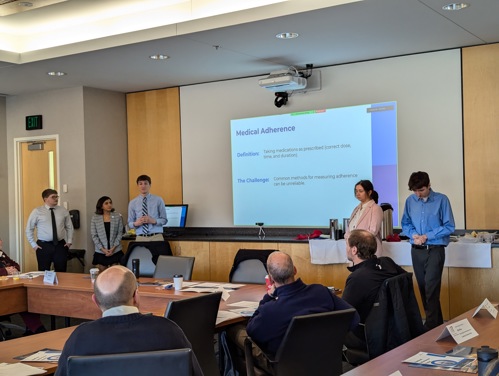 A group of senior computer science students in the Romain College of Business are at the forefront of and playing a major role in shaping the future of mental health.
A group of senior computer science students in the Romain College of Business are at the forefront of and playing a major role in shaping the future of mental health.
During this Fall Semester, a team of five senior students–Joshua Dellamuth, Addison Higgins, Peyton Hopkins, Karen Rivas Morales and Cathy Sandoval–under the guidance of Dr. Srishti Srivastava, Associate Professor of Computer Science, and Josh McWilliams, Instructor in Computer Information Systems, worked on a senior capstone project that involved analyzing mental health data, specifically measuring adherence to behavioral health prescriptions. This project was capped by a presentation at the fall IT Alliance board meeting on December 6.
The idea was first introduced in the spring of 2023 when USI’s partnership with behavioral health analytics company Holmusk and their unique data analytics platform NeuroBlu began. The partnership was facilitated by Dr. Sudesh Mujumdar, Dean of the Romain College of Business. Srivastava’s students were originally tasked with developing a code to help them comb through over 30 million anonymized patient records and 20-plus years of data. The functions and code the students have developed will be utilized by Holmusk on the NeuroBlu platform.
“I have seen a lot of growth in the students, and it’s been an amazing experience for them,” said Srivastava. “I was fortunate to have this group of students who were truly motivated. I’m very proud of the progress they’ve shown–this is a set of our star students.”
The primary goal of the students this semester was to help determine if patients will take certain prescriptions and medications related to Major Depressive Disorder. Leading up to the project, students did research on different papers that had been published to give them background knowledge on the medications and medical data in general. They learned there were a variety of factors for them to implement into their code to help them predict if someone is going to take their medication.
One of the biggest hurdles for the students during this process was learning how to read and analyze medical data. There were moments, they said, where they honestly thought they were stuck and were unable to go any further without getting the answers they were looking for. But they continued to work together as a group and overcame their struggles.
“One of the interesting things about this project is that a lot of the setup has been kind of understanding more about the medical industry rather than typically just coding, which is what we’d normally expect for a senior project,” said Hopkins. “We had a chance to get our hands dirty and dive a little deeper. It’s been a very interesting experience to work with data of this scale.”
 It is incredibly rare for college students to have access to this type of data, especially at the undergrad level. Members of the Holmusk team, who worked with the students on a weekly basis while answering questions and providing insight, were amazed at just how much the USI students truly cared about what they’d created.
It is incredibly rare for college students to have access to this type of data, especially at the undergrad level. Members of the Holmusk team, who worked with the students on a weekly basis while answering questions and providing insight, were amazed at just how much the USI students truly cared about what they’d created.
“This group demonstrated resilient dedication toward solving health care challenges using real world data,” said Sri Nukala, Senior Product Manager at Holmusk. “Their hunger to learn and approach to solving problems using creative solutions are impressive.”
As this group of students prepares to wrap up their undergrad studies and enter their respective careers, they’re grateful to have had the opportunity to work with real-world data that is truly impacting the livelihood of mental health patients. It’s these types of experiences that help them be more than prepared for post-graduation.
“Some projects that you do in school are all pre-tested with mock data,” said Dellamuth. “But this isn’t fake data, this is real life experience. It helps a lot before you get out into the working world.”
Higgins added, “We have a model that we are truly proud of. It’s great to be able to show off what we’ve done.”